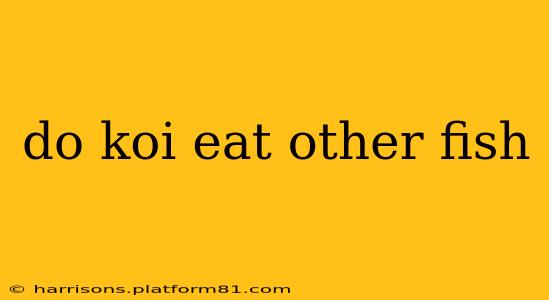Do Koi Eat Other Fish? A Comprehensive Look at Koi Diet and Behavior
Koi, those vibrant and graceful fish prized for their beauty, often spark curiosity about their dietary habits. A common question is: Do koi eat other fish? The short answer is: it depends. While koi are primarily herbivores and omnivores, their feeding behavior can be complex and influenced by several factors. Let's delve deeper into this fascinating aspect of koi fishkeeping.
What is the typical diet of a koi fish?
Koi have a varied diet, leaning towards being omnivores. Their primary food sources include:
- Plant matter: Algae, duckweed, water lettuce, and other aquatic plants are staples in their diet. These provide essential nutrients and fiber.
- Commercial Koi food: Specifically formulated pellets or flakes provide a balanced nutritional profile, containing protein, vitamins, and minerals necessary for healthy growth. Choosing high-quality koi food is crucial for optimal health.
- Insects and larvae: Koi will readily consume insects, larvae, and other invertebrates that fall into their ponds or are present in the water. This natural foraging adds variety to their diet.
- Worms and crustaceans: Some koi may also eat worms and small crustaceans, contributing to their protein intake.
Under what circumstances might koi eat other fish?
While not their preferred food source, koi can eat smaller fish under specific conditions:
- Opportunity: If a smaller fish is injured or weak, a koi might seize the opportunity to consume it. This is more likely to occur if the koi is underfed or if there's a shortage of their usual food sources.
- Size disparity: Large koi, especially in densely populated ponds, may prey on smaller fish if the size difference is significant. This is a case of survival of the fittest within the aquatic environment.
- Territoriality: Koi can exhibit territorial behaviors, particularly during breeding season. In these instances, aggression towards smaller fish might lead to predation. Providing ample space in the pond can help mitigate this.
- Hunger: If koi are consistently underfed, they might resort to eating other fish to satisfy their hunger. This underscores the importance of regular and appropriate feeding.
Do koi eat their own eggs or fry?
Yes, unfortunately, koi can sometimes consume their own eggs or fry. This behavior is often attributed to a lack of adequate hiding places for the eggs and fry, or to simply being opportunistic feeders. Providing suitable breeding areas with plenty of vegetation can help reduce cannibalism.
How can I prevent my koi from eating other fish?
To prevent your koi from eating smaller fish, consider these strategies:
- Proper feeding: Maintain a regular feeding schedule with high-quality koi food to ensure they are well-nourished and less likely to resort to predation.
- Sufficient space: Provide ample space in your pond to reduce competition and territorial aggression.
- Species selection: Choose compatible pond mates that are unlikely to become prey for your koi.
- Hiding places: Include rocks, plants, and other structures in your pond to create safe havens for smaller fish.
In conclusion, while koi don't typically hunt other fish as their primary food source, various factors can lead them to consume smaller or weaker fish. By understanding their dietary needs and behavior, and by providing a suitable environment, you can minimize the chances of this occurring. Proper feeding and pond management are key to maintaining a healthy and harmonious aquatic ecosystem.
